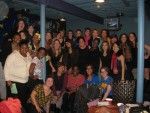Vaginas That Talk: The Vagina Monologues Celebrate Female Empowerment

There are vaginas everywhere.
Thursday, February 25, I walk into The Palace Theater after braving the elements, and there are vaginas for as far as the eye can see. They’re on the pink programs, they’re on the Superman themed t-shirts, they’re on the lollipops and the cupcakes. And there are Clittails – not to be confused with cocktails – being served on the second floor. The female genitalia has been displayed unapologetically around the theater, but then again, how else would you decorate for The Vagina Monologues?
The 1996 episodic play, written by the Eve Ensler, is an annual affair at Colgate, and was directed this year by sophomore Dena Robinson. As the title suggests, the play consists of a variety of monologues performed by different women all relating to the vagina. The monologues were originally written following interviews Ensler conducted with 200 women about…well, their vaginas. Each participant was asked what their vaginas would say if they could talk (“Slow Down, Start Again, Enter at Your Own Risk…”) and what they would wear, if they would wear anything at all (Ball gown, pink boa, sweat pants…). From these sprang the monologues that explore everything from sex to rape, masturbation to mutilation and the ever-elusive female orgasm. Ensler composed the play in order to shine a light on the female experience that is rarely talked about. Robinson stepped up to direct the play in order to highlight the female empowerment that the vagina embodies.
“I’d been active on The Vagina Monologues core since my first year here at Colgate and had seen the wonderful work the previous director had done with making the production a success,” Robinson said. “Feminism is what I do and is something that is extremely close to my heart. It always fills me with joy when I can help in any way, shape or form to inspire and empower women.”
Starting from winter break right up until the actual performance dates, preparation for the production came slowly, according to Robinson. The Vagina Monologues Organization, headed by Ensler, is the body that chooses the monologues to be performed each year. Campuses around the country perform the chosen spotlight, the selected monologues as well as an optional monologue. But beyond that, college campuses do not have much of a say with the exception of auditions. In a democratically feminist fashion, all those who auditioned were offered a spot in the show, including the sole male performer in the play.
“I was playing a female-bodied character and the point was to forget that I am actually male-bodied,” first-year Patrick Weaver said of his role in They Beat the Girl out of My Boy…Or So They Tried. “My perspective was somewhat different going into this, as I do not actually possess a vagina, and therefore am unfamiliar with many of the issues the other actresses face. However, the cast just saw me as one of the girls, which is what I wanted.”
With help from student groups Sisters of the Round Table (SORT), Late Gate and the Center for Women’s Studies, The Vagina Monologues performances were extremely popular with the majority female audience. I felt sympathy flood the theater during Robinson and Women’s Studies and Asian Studies Administrative Assistant Letta Palmer’s A Teenage Girl’s Guide to Surviving Sex Slavery (“Never look at him while he’s raping you”); I laughed when I heard senior Laura McDonald in The Vagina Workshop (“I had always thought of my vagina as an anatomical vacuum randomly sucking up particles and objects from the surrounding environment.”); and we all understood first-year Christina Liu’s plight in My Angry Vagina (“Thong underwear. Who thought that up?”).
Or at least most of us did.
“The Vagina Monologues were stellar as always. It felt like a nice cozy fireside conversation about everyone’s funniest, strangest and most intimate stories,” senior Shauna Ono said. “But there was definitely a tone of sadness. Women around the world cannot all be as comfortable and free with their bodies and instead their bodies are often the grounds for abuse.”
As for the Colgate male perspective, first-year Nathaniel Goehring had other thoughts.
“I felt like I wasn’t really in on the joke. I never felt uncomfortable, I just felt like, since I don’t have a vagina, a lot of the monologues were irrelevant for me,” Goehring said. “But the same would probably be true for many girls if they attended ‘The Penis Monologues’.”
The Vagina Monologues supports women in ways beyond awareness. 45 percent of the money raised will be donated to the women and children of Vera House in Syracuse and the Victims of Violence (Liberty Resources Center) in Oneida while 10 percent will go to help build the City of Joy in Bukavu, South Kivu. The women and girls of the Democratic Republic of Congo (DRC) are the main beneficiaries of this year’s celebration of V-Day, a global movement to end violence against women and girls founded by Ensler. So far, they have raised almost $3500.
The play may begin with “Vagina. It doesn’t matter how many times you say it, it never sounds like a world you want to say,” but Robinson hopes that by the end of it, you’ll feel a little different.
“To me The Vagina Monologues symbolizes everything I am. It raises awareness, it is hungry for female empowerment and it creates safe spaces,” Robinson said. “The vagina is not something to be scared of or to regard as vulgar. It’s a beautiful thing. I hope the audience can walk away more aware of the issues women face and feel empowered to take action.”
And she’s right. After seeing The Vagina Monologues, I am proud to be a woman. I am proud to have a vagina. Dena Robinson has done her job well.






